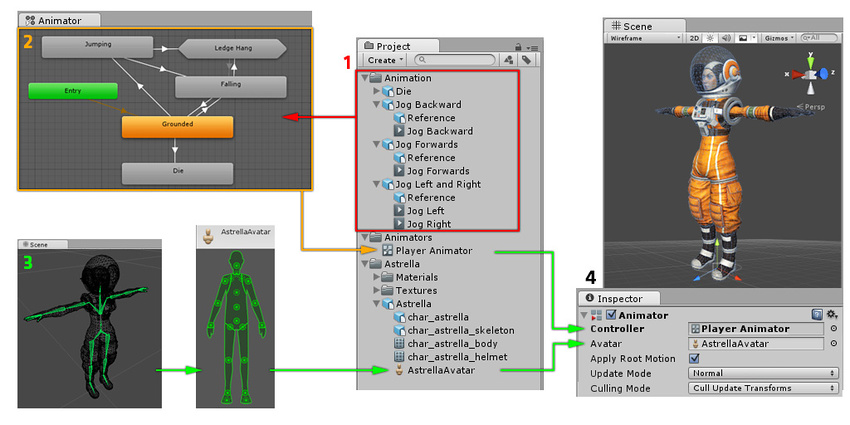Mecanim Animation system
The Mecanim Animation system is based on animation clipsAnimation data that can be used for animated characters or simple animations. It is a simple “unit” piece of motion, such as (one specific instance of) “Idle”, “Walk” or “Run”. More info
See in Glossary. An animation clip contains information about how a character or GameObjectThe fundamental object in Unity scenes, which can represent characters, props, scenery, cameras, waypoints, and more. A GameObject’s functionality is defined by the Components attached to it. More info
See in Glossary changes its position, rotation, or other properties over time. Think of each animation clip as a recording. An animation clip from an external source is created by an artist or animator with third-party software, such as Autodesk® 3ds Max® or Autodesk® Maya®.
You can organize many animation clips into a structured flowchart-like system called an Animator ControllerControls animation through Animation Layers with Animation State Machines and Animation Blend Trees, controlled by Animation Parameters. The same Animator Controller can be referenced by multiple models with Animator components. More info
See in Glossary. The Animator Controller acts as a state machineThe set of states in an Animator Controller that a character or animated GameObject can be in, along with a set of transitions between those states and a variable to remember the current state. The states available will depend on the type of gameplay, but typical states include things like idling, walking, running and jumping. More info
See in Glossary which keeps track of the animation clip being played and the criteria for when the next animation clip should be played.
For example, a simple Animator Controller might contain a single animation clip for a collectable item that spins and bounces. An Animator Controller for a door might contain two animation clips: one for the door opening and a second for the door closing.
A more advanced Animator Controller might contain a dozen humanoid animationsAn animation using humanoid skeletons. Humanoid models generally have the same basic structure, representing the major articulate parts of the body, head and limbs. This makes it easy to map animations from one humanoid skeleton to another, allowing retargeting and inverse kinematics. More info
See in Glossary for each of a character’s actions such as idle, turning, walking, and jogging. This Animator Controller might use blend trees to blend between multiple animation clips and provide fluid motion as the player moves around the sceneA Scene contains the environments and menus of your game. Think of each unique Scene file as a unique level. In each Scene, you place your environments, obstacles, and decorations, essentially designing and building your game in pieces. More info
See in Glossary.
The Mecanim Animation system also provides special features for handling humanoid characters including the ability to retarget animation from one source to another and adjust muscle definitionsThis allows you to have more intuitive control over the character’s skeleton. When an Avatar is in place, the Animation system works in muscle space, which is more intuitive than bone space. More info
See in Glossary to ensure that a character deforms correctly. For example, you can retarget animation from a third-party animation library to your own character then adjust the its range of motion. These special features are available through Unity’s AvatarAn interface for retargeting animation from one rig to another. More info
See in Glossary system which maps humanoid characters to a common internal format.
The Animation Clips, the Animator Controller, and the Avatar, are connected together through a GameObject with the Animator ComponentA component on a model that animates that model using the Animation system. The component has a reference to an Animator Controller asset that controls the animation. More info
See in Glossary. This component references an Animator Controller and, if required, the Avatar for the model. The Animator Controller also references its animation clips.

The previous diagram demonstrates the following workflow:
- Animation clips are imported from an external source or created within Unity. In this example, they are imported humanoid animations.
- Animation clips are placed and arranged in an Animator Controller. This demonstrates an Animator Controller in the Animator windowThe window where the Animator Controller is visualized and edited. More info
See in Glossary. The States, which may represent animations or nested sub-state machines, display as nodes connected by lines. This Animator Controller exists as an asset in the Project windowA window that shows the contents of yourAssetsfolder (Project tab) More info
See in Glossary. - The rigged character model, an astronaut named
Astrella, has a specific configuration of bones mapped to Unity’s Avatar format. The mapping is stored as an Avatar asset, under the imported character model in the Project window. - When animating the character model, it has an Animator component attached. In the InspectorA Unity window that displays information about the currently selected GameObject, asset or project settings, allowing you to inspect and edit the values. More info
See in Glossary window, the Animator Component has the Animator Controller and the Avatar assigned. The animator uses these together to animate the model. The Avatar reference is only necessary when animating a humanoid character. For other types of animation, only an Animator Controller is required.
The following topics provide more details on the Mecanim Animation system:
- Animation Clips
- Humanoid Avatars
- Animator component
- Animator Controller
- Animator Override ControllerAllows you to create multiple variants of an Animator Controller, with each variant using a different set of animations, while retaining the original Controller’s structure, parameters and logic. More info
See in Glossary - Playables API
- Performance and Optimization
- Mecanim FAQ